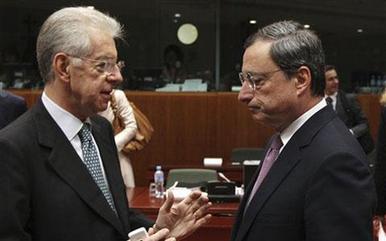
This is the VOA Special English Economics Report.
Stock prices around the world rose and fell this week on news of efforts to help countries using the euro.
The European Central Bank took action Wednesday to support the worldwide financial system. Central banks in Britain, Canada, Japan, Switzerland and the United States also acted.
The banks made it less costly for other countries to borrow American dollars. The United States Federal Reserve said the joint effort was meant to help central banks in Europe provide financial support to nations that need it. The action sent American stock measures up more than three percent.
On Thursday, European Central Bank President Mario Draghi suggested that the ECB may provide new financial support for European countries struggling with debt. But first, he said, euro-area countries must establish trust by enacting big financial reforms. He called for a new fiscal compact, or financial agreement.
MARIO DRAGHI: "A credible signal is needed to give ultimate assurance over the short term. What I believe our economic and monetary union needs is a new fiscal compact, a fundamental restatement of the fiscal rules together with the mutual fiscal commitments that euro area governments have made."
Seventeen members of the European Union share the euro currency. Concern over its future has been building in recent years. The Greek debt crisis, rescue loans for Ireland and Portugal, and worries over Italy's debt have all increased fears that Europe may have to abandon the euro.
The euro is the world's second most traded and second most used reserve currency after the United States dollar.
European finance ministers failed to agree on a plan to provide economic support for debt-troubled countries last month. European Economic Commissioner Olli Rehn says the need for agreement is urgent.
OLLI REHN: "Overall, I could say that we are now entering the critical period of 10 days to complete and conclude the crisis response over the European Union."
Financial officials say a lack of economic and financial cooperation is at the heart of the two-year debt crisis. Dutch Finance Minister Jan Kees de Jager said the need for tougher rules is deep.
JAN KEES DE JAGER: "Lack of economic reforms and lack of fiscal discipline has brought us into this crisis. So you also have to address these fundamental issues."
That means euro-nations may have to surrender some power over their budgets to the European Union.
And that's the VOA Special English Economics Report. Lisa Bryant contributed to this report. I'm June Simms.
To end crisis, leaders told: Get behind euro
Europeans have deep doubts about euro
Euro skeptics gaining support, new poll shows
EU summit seeks debt crisis solution
(來源:VOA 編輯:Rosy)
